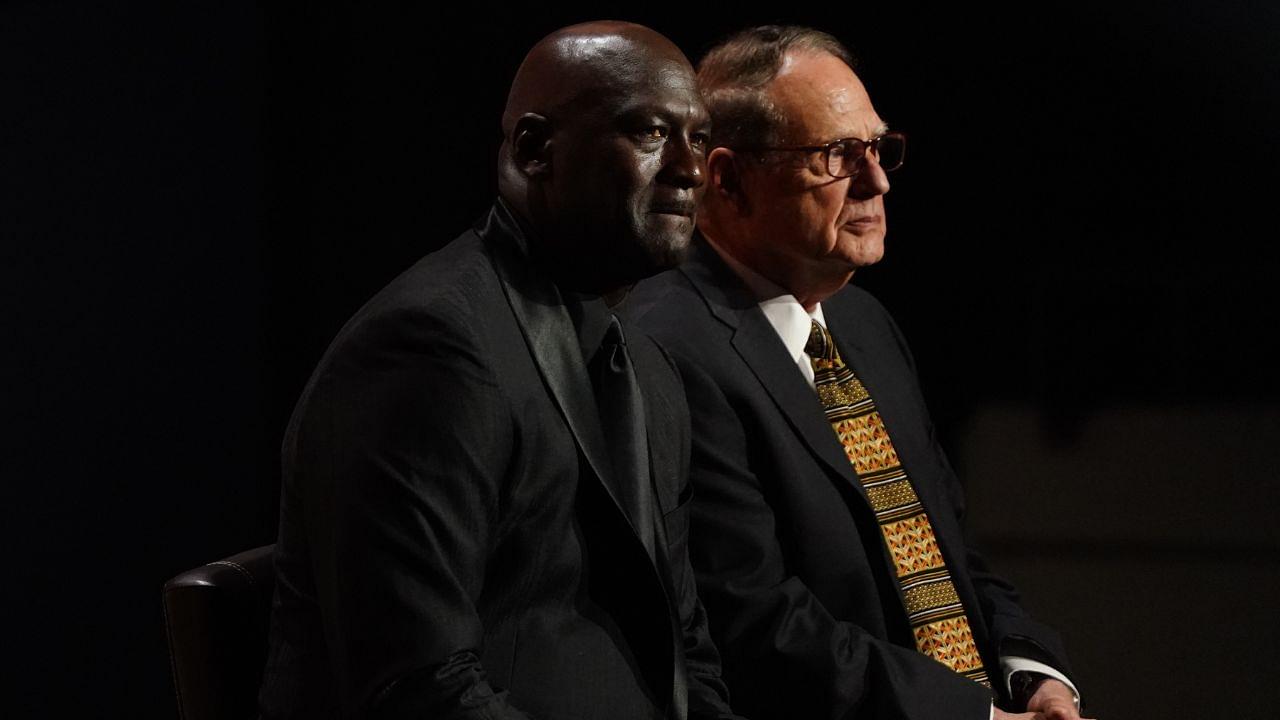Few partnerships have proven as intriguing in the history of sports as that between Michael Jordan and Chicago Bulls owner, Jerry Reinsdorf. While basketball aficionados are well-acquainted with their on-court triumphs, their off-court financial maneuvers remain a captivating tale. As excerpts from the book “Michael Jordan: The Life” reveal, the financial bond they forged held unexpected layers, and caused many accusations, making it a standout chapter in the history books of the sports business.
Advertisement
It was during the early 1990s that Jordan’s basketball prowess propelled the Chicago Bulls into the spotlight. He had become more than a player, transforming into a cultural phenomenon. However, his sudden departure from the NBA to pursue a career in baseball left fans, fellow players, and the league stunned. The fact that the Bulls’ owner, Jerry Reinsdorf, continued to pay Jordan a salary of $3,100,000, drew both admiration and skepticism. Many even wondered whether this was a gesture of goodwill, a savvy business move, or something more intricate beneath the surface.
A Fusion of Financials and Friendship Amidst Complicated Business Dynamics
Beyond the spreadsheets and contracts, Michael Jordan and Jerry Reinsdorf shared a distinct rapport that transcended mere business transactions. Their relationship was a blend of competition, collaboration, and companionship, and the financial aspect was just one thread in a deeper relationship. Reinsdorf’s decision to continue paying Jordan in his baseball days showcased a deeper connection—one that extended beyond court triumphs.
Scratch beneath the surface, and you’ll find that Jordan’s sustained salary wasn’t just a contractual formality; it was a strategic masterstroke. Reinsdorf’s unwavering commitment wasn’t a mere salary transaction; it was a calculated maneuver to preserve the legacy of the franchise’s cornerstone.
This move wasn’t just about numbers on a check—it was a play that showcased the delicate balance between honoring a legend and charting a path for future success. The NBA is a league with a very delicate balance and players do notice how teams treat other players, especially legends like Jordan. It makes it easier to trade for stars and sign players in free agency while maintaining the goodwill of stars who later turn into advocates for the ball club.
However, as rumors spread, some within the league saw Jerry Reinsdorf’s actions as more than just a business decision. The move to keep Jordan on the payroll during his baseball foray was perceived by some as a calculated maneuver—a subtle way to retain the superstar’s loyalty and maintain a connection that transcended the confines of the court. They saw it as a business-savvy move that will guarantee future financial rewards.
As doubts lingered about the Bulls’ future without their star player, Reinsdorf’s unconventional strategy proved visionary. Detailed statistics on attendance, ticket sales, and revenue during Jordan’s baseball hiatus substantiate the impact of his presence, not just on the court, but on the balance sheets as well. Through the lens of financial data, we see how Reinsdorf’s calculated risk paid off, underscoring the synergy between the Bulls’ competitive success and their financial prosperity.
Here’s an excerpt from the book Michael Jordan: The Life that sheds light on Reinsdorf’s decision,
“The Bulls continued to pay Jordan in his retirement, which, according to one of Reinsdorf’s associates, was a gesture of loyalty from Reinsdorf to Jordan. More cynical observers pointed out that by continuing to pay Jordan, the team also kept his salary slot open under the league’s labyrinthine salary cap rules. If nothing else, the circumstances suggested the difficulty of fostering personal relationships amid the conflicts of business. Even kind gestures could be interpreted as ploys.”
Admittedly, it is a bit sad that the generosity of Jerry Krause was perceived by many as nothing more than a shrewd business decision. However, at least the team owner added three more rings to his collection when MJ paid his generosity back by joining the Bulls again after coming out of retirement.
The Battle for Extra Compensation: Negotiating Beyond the Arena
The spotlight shifted to a defining moment in the Jordan-Reinsdorf saga when MJ made a bold demand. Seeking an extra paycheck for his role in boosting attendance and revenue in the United Center, Jordan approached Reinsdorf with a plea for greater compensation. The demand was undeniable—Jordan’s transcendent presence had undeniably transformed the Bulls’ financial fortunes.
Jordan’s argument hinged on the undeniable fact that his star power significantly impacted the bottom line. The United Center, the Bulls’ home arena, was a testament to this phenomenon. With Jordan on the court, ticket sales soared, and game attendance became a spectacle. Fans from all corners of the world flocked to witness his gravity-defying moves and killer instinct. The arena reverberated with the energy of thousands, and each game became an event etched in memory.
Reinsdorf’s smart denial of Jordan’s demand had more layers than met the eye. Beyond the allure of additional revenue, Reinsdorf saw a bigger picture—a delicate financial ecosystem that thrived on stability. Paying Jordan more might lead to a cascade effect, reshaping player contracts and potentially destabilizing the team’s financial structure.
The United Center was not merely a stadium—it was a mecca for basketball enthusiasts, a testament to the Bulls’ legacy, and a cornerstone of Chicago’s sports identity. The arena’s revenue streams extended beyond ticket sales, encompassing merchandise, concessions, and even partnerships. Corporate giants sought to associate themselves with the aura of a Jordan-led Bulls game. The arena’s name and branding garnered value from Jordan’s star power, and the financial implications of this dynamic stretched far and wide.
Reinsdorf’s denial wasn’t solely about a single paycheck—it was about preserving a financial equilibrium that sustained the entire Bulls franchise. As a seasoned owner, he understood that making concessions to Jordan could alter the landscape of player contracts, potentially leading to inflated demands across the roster. This delicate balance needed to be maintained to ensure the Bulls’ long-term viability and competitiveness.





